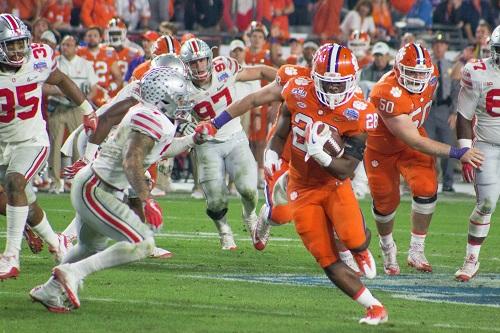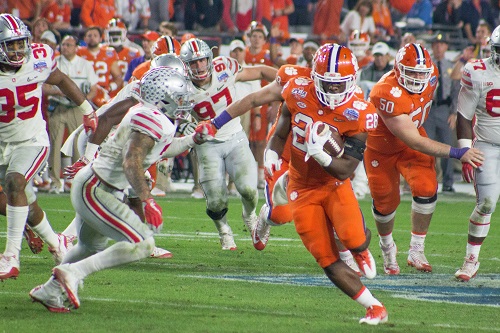

As of Dec. 15, 11 bowls had been canceled, and more were likely to be scuttled prior to the College Football Playoff National Championship game slated for Jan. 11 in Miami Gardens, Fla.
This is bad news for all involved. As USA Today‘s Brent Schrotenboer wrote:
In every year but this one, the main purpose of modern college football bowl games could be easily explained: They exist to increase local tourism and produce a festive experience for participating teams and their fans, according to their stated missions. They also provide valuable live television programming during the holiday season for The Walt Disney Company, which owns ESPN and ABC.
But then came the COVID-19 pandemic, turning much of that upside down: What is the point of them if tourism is discouraged and fan attendance is severely limited because of public health restrictions? And just how festive can these games be during a dark winter like this, when pregame parades have been canceled and bowl teams are mostly confined to their hotels?
Adding insult to injury is the fact that the NCAA had previously waivedthe minimum bowl-eligibility requirements for teams this year — potentially paving the way for some unexpected teams to earn a bowl berth.
“Providing a more flexible framework for the postseason in this unprecedented time will provide some certainty moving forward,” Shane Lyons, athletic director at West Virginia and chair of the NCAA’s Division I Football Oversight Committee, said when requirements were waived in October. “These are important postseason opportunities for our student-athletes, and this will help everyone to prepare.”
Here is a list of the bowl games that have been canceled (in order of cancellation announcement), as well as where they were scheduled to be played:
- Redbox Bowl: Levi’s Stadium in Santa Clara, Calif.
- Hawai’i Bowl: Aloha Stadium in Honolulu, Hawai’i
- Bahamas Bowl: Thomas Robinson Stadium in Nassau, Bahamas
- San Diego County Credit Union Holiday Bowl: SDCCU in San Diego, Calif.
- Quick Lane Bowl: Ford Field in Detroit
- New Era Pinstripe Bowl: Yankee Stadium in New York City
- Tony the Tiger Sun Bowl: Sun Bowl Stadium in El Paso, Texas
- Fenway Bowl: Fenway Park in Boston
- Cricket Celebration Bowl: Mercedes-Benz Stadium in Atlanta
- Las Vegas Bowl: Allegiant Stadium in Paradise, Nev.
- LA Bowl: SoFi Stadium in Los Angeles
- Tropical Smoothie Café Frisco Bowl: Toyota Stadium in Frisco, Texas
It’s noteworthy that the first of the bowls to cancel — the Redbox Bowl — announced the news on July 31, back when uncertainty swirled about whether there would even be a college football season. Other cancellations were not made until early October. The Fenway Bowl, scheduled for Dec. 20, and the LA Bowl, slated for Dec. 30, would each have made their debut in 2020.
“It’s sad, and there is a lot of hurt in the Sun Bowl family, but canceling the game is better than the hurt COVID would cause,” Sun Bowl football committee chairman John Folmer told local media. That game was scheduled for Dec. 31.
Josh Dill, director of sports & events for Visit Frisco in Texas, says that city was expected to take in an estimated $1.1 million from the Frisco Bowl, according to CommunityImpact.com.
“We’re disappointed the game has been canceled, but the health and safety of players, staff, fans and our community are the top priority,” Dill said. “The loss of this year’s bowl game and its potential … impact to the city will be felt by our entire hospitality community.”
As CommunityImpact.com reporter Matt Payne wrote, the game “typically nets far more [than $1.1 million], with previous years seeing about $3.5 million from the Frisco Bowl. But reduced seating capacity and smaller travel parties already led to Visit Frisco’s conservative estimation.”
Some bowl games still on the schedule, including major ones such as the Rose and Fiesta Bowls, were initially scheduled to be played without fans.Those decisions were made in early December.
According to ESPN:
The Tournament of Roses said it requested special permission for a limited number of fans or select number of guests of both teams to be in attendance for the Rose Bowl, which will be played on New Year’s Day in Pasadena, Calif., but was denied because of COVID-19 restrictions imposed by the state, county and city of Pasadena.
… The Fiesta Bowl, which will be played Jan. 2 at State Farm Stadium in Glendale, Ariz., won’t allow fans but will allow families of the teams playing to attend. In a release, the Fiesta Bowl said the decision not to allow fans in the game was made by “local jurisdictions,” which based its judgment on recommendations from the Arizona Department of Health Services (ADHS) in an effort to slow the spread of COVID-19
But as the games moved closer, we saw yet another switch: The College Football Playoff semifinal scheduled to take place at the Rose Bowl Stadium in Pasadena, California, was subsequently moved to AT&T Stadium in Arlington, Texas. The game will take place Jan. 1 and be broadcast by ESPN.
Bowl games that are played likely will suffer major financial loses, according to Nick Carparelli, executive director of Bowl Season, the collective coalition of all bowl games. They will not have “money pulled by the [local] sports commission or convention and visitors bureau because the bowl game won’t be bringing an economic impact to the city this year without fans in attendance,” he told sports business website Sportico.com. “It’s a big hit that people don’t talk about.”
SportingNews.com is tracking which teams are playing when in each of the remaining bowl games.

